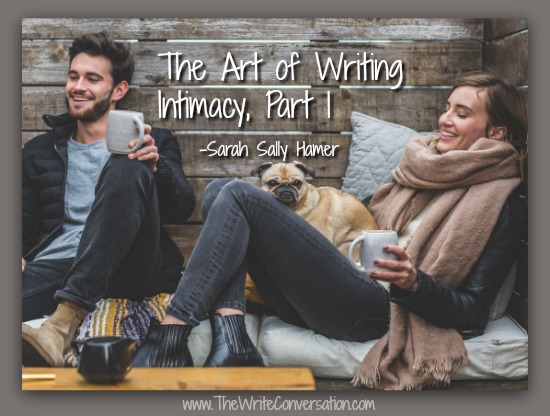The Art of Writing Intimacy, Part 1
Intimacy. What a suggestive word. It immediately brings up images of satin sheets, steamy love songs and sweaty bodies.
But that�s not all of it. In fact, love-making is only one aspect of intimacy and may even have nothing to do with it.
http://www.thefreedictionary.com/intimacy gives three descriptions of intimacy:
1. A close or warm friendship, familiarity, closeness, friendliness�a friendly disposition
2. A usually secretive or illicit sexual relationship; affaire, amour, liaison, affair, involvement, sexual relationship�a relationship involving sexual intimacy
Sex is only included in one of the three descriptions, for a very good reason. Intimacy is not about sex! Sex is just one of many diverse expressions of intimacy
As you can see, other expressions are friendship, closeness, togetherness, a feeling of belonging. Another is hate. Not hate of strangers, but of someone who knows a person well. Imagine your most evil villain. If there is not an intimacy of knowledge between that villain and your protagonist, the relationship is shallow and, ultimately, impersonal. (Terrorists and truly insane people kill for the sake of killing�without knowing or caring about their victims. That�s not what we�re talking about here.)
Think of Hannibal Lector and Clarice. It�s the intimacy he demands from her that makes him so very, very creepy. Inch by inch, he exacts payment from her in return for the information she so desperately needs to save the lambwho Buffalo Bill intends to skin, and that payment is in an intimacy she has withheld from everyone else. Even Buffalo Bill understands intimacy. He calls the kidnap victim it, so he cannot feel a link to her. If he becomes too involved with her�if she becomes a real person to him�he might not be able to kill her and fulfill his own goal.
Intimacy is directly connected to relationships of all sort. And the stronger the intimacy between the protagonist and a villain, the stronger the story.
What genres need intimacy? ALL of them. From a sweet love story with nothing going on below the neck to the hottest erotica with no holds barred. From a creepy suspense to the goriest murder mystery. From a women�s fiction to a man�s adventure. EVERY ONE of them needs some level of intimacy.
So. What is intimacy, how do we create it and how can we use it in our writing?
One of the foremost authorities on intimacy is Desmond Morris, a zoologist, ethologist and anthropologist. His study of interactions between apes led him to an understanding of how humans interact also and his book, Intimate Behavior, is considered a classic.
Morris created a twelve-step listing of how intimacy evolves:
- Eye to Body
- Eye to Eye
- Voice to Voice
- Hand to Hand
- Arm to Shoulder
- Arm to Waist
- Mouth to Mouth
- Hand to Head
- Hand to Body
- Etc�
This is not exactly how all relationships progress, of course, but it gives a very good structure for the different levels of physical intimacy. And, ultimately, almost all of these steps take place at some point in the relationship.
But physical intimacy is only the tip of the iceberg. In fact, without emotional intimacy, physical intimacy might be just another term for rape. Some stories jump right into physical intimacy�erotica, some men�s fiction (think James Bond), even some adventure stories where it seems that only a single glance is exchanged then, suddenly, there�s all sorts of heavy breathing going on. No judgment here�different stories for different genres for different people�but understanding how intimacy works can show why, when intimacy is rushed, some stories don�t ring true. Intimacy has a progression, no matter what type of book.
In Part Two, we�ll create another set of steps�one that will work for other genres as well.
TWEETABLES
Sarah (Sally) Hamer is a lover of books, a teacher of writers, and a believer in good stories. Most of all, she is eternally fascinated by people and how they 'tick'. She�s passionate about helping people tell their own stories, whether through fiction or through memoir. Writing in many genres - mystery, science fiction, fantasy, romance, medieval history, non-fiction � she has won awards at both local and national levels, including two Golden Heart finals.
A teacher of memoir, beginning and advanced creative fiction writing, and screenwriting at Louisiana State University in Shreveport for over twelve years, she also teaches online for Margie Lawson at www.margielawson.com. Sally is a free-lance editor and book coach, with many of her students and clients becoming successful, award-winning authors. You can find her at www.sallyhamer.blogspot.com or on Twitter @sarahsallyhamer.
I wish to express gratitude to the giants whose shoulders I stand on, from whom I learned the craft of writing. I would list every one, if it were only possible.





Comments
Post a Comment